|
William
Robert
Wherry
(1841-1915)
|
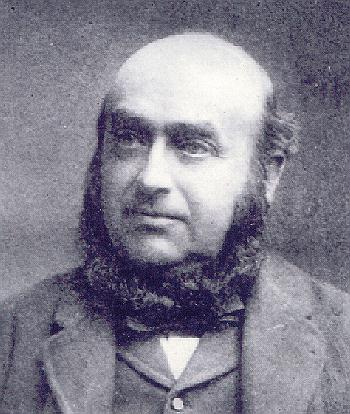 |
The name of
Wherry has been associated with Bourne for the past two centuries as a mark of both enterprise and commercial success but one man stands out not only for his contribution to the family business but also for his service to the community that has been unequalled since. He was William Robert Wherry.
His grandfather, Edward Wherry was the proprietor of the village stores at Edenham, as were his ancestors, but he had expansion in mind and he bought the premises of John Gibson in North Street in 1806 and started trading as a grocer and draper. His sons William and Edward joined the business that soon expanded to include seeds. When John Gibson died in 1825, William Wherry bought the buildings and yard across the road on the east side of North Street from his trustees and Wherry's shop with its distinctive bow window continued to trade on the same site until the mid-20th century although the premises were
sold and eventually demolished to make way for the Burghley Centre development in 1989.
Edward Wherry senior was a deacon of the Baptist Chapel in West Street and he laid the foundation stone when it was built in 1835 at a cost of
£1,700, an appropriate choice because members of his family were destined to serve as deacons for more than 100 years. His firm of
Messrs Edward Wherry and Sons, merchants, quickly progressed and a wholesale section was added to the business and an additional showroom opened. Both road and water transport on the Bourne Eau were used by the company to send and receive goods and by the mid-19th century, items of drapery were being brought in by wagon from as far afield as Manchester while the opening of the railways and Bourne's connection to the main line also greatly increased their volume of business.
|
Wherry's warehouse
in South Street, one of the properties purchased by William Wherry
in 1894 from the estate of Thomas Turnell Mawby, and this became
the centre of the company's operations for the next 75 years. |
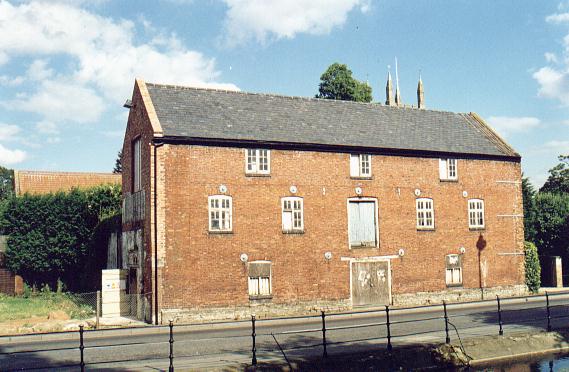 |
William Wherry made a point of attending the twice-yearly cheese fair at Leicester to buy supplies and to get there in the early days, he travelled to Melton Mowbray by horse and then finished the journey by coach. He attended the fair a total of 99 times and became such a familiar figure among the buyers that he achieved the honour of sitting next to the chairman at the luncheon that always followed the cheese sales. When the time came to make his 100th visit, he was greatly annoyed when his family refused to allow him to make the journey because of ill health and so he was baulked from completing his century.
|
 |
William Wherry senior built a family home at No
17 North Street in 1840 with shop premises below. His children
Albert, Florence, William, Harold, Edward, Frank, Anne, Gertrude,
Mary and Arthur were all born there. |
In 1856, William Wherry's 15-year-old son joined the company as an apprentice. He was William Robert Wherry and five years later he took sole charge of the grocery department and the buying of drapery with which he was connected for the next 17 years. He also developed the trade in seed and grain, thereby laying the foundations of the firm's present activities. The business prospered under his control, particularly the agricultural side, to such an extent that it was created into a separate concern trading as W R Wherry & Co and contracts for root seeds were placed with local farmers on behalf of most of the leading seed houses.
For 26 years, he purchased all of the white mustard seed for Keen Robinson and Co, the firm that ultimately amalgamated with Messrs Colman of Norwich and to store this seed ready for transport, he bought a large waterside warehouse in Eastgate. The company also operated a windmill in North Road with three pairs of stones, two for wheat and one for barley. The mill became a landmark in the town but lost its four sails when it was struck by lightning in 1915 and the stump was finally demolished in June 1994.
By the 1870s, Wherry had built up an extensive business with connections throughout Britain and in several countries overseas including the United States and France while trade in this country was being done not only by rail but also by coastal steamer. In 1877, for instance, a shipping company at King's Lynn in Norfolk was handling casks of soda from Newcastle and bound for Wherry's in Bourne while peas were being shipped outwards to places such as Glasgow and wheat was transported to a firm at Leith on the London steamer.
It was evident that Wherry was a man of enterprise who was prepared to break into any new line of business that might show a profit and be beneficial to his company. Not only was he trading in groceries, drapery and seeds, but by 1880 he was also selling quantities of tallow to a soap works at Wakefield in Yorkshire and to firms elsewhere. He was also sending snowdrops to be sold in Glasgow and jonquils and lilies to a firm in London while they were also doing business with the House of Correction at Folkingham. A letter to Wherry's from the prison governor in 1877 offered to supply the firm with "anything you may require in the shape of Brush Door Mats" and a few days later, he acknowledged the firm's order and sent off two bundles of mats with more to follow, all no doubt made by the prisoners.
|
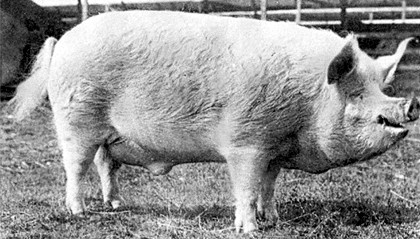 |
|
During this period, he
and his son, Edmund (1880-1928), were also renowned
breeders of pure bred large white pigs with a reputation for keeping them
in first class condition. They insisted on having their feet cleaned
and manicured and it was also rumoured that they even had shoes made for them.
One of them, Bourne King David, won twelve championships between
1922 and 1925. |
Wherry was possibly the first man in this country to recognise the need in the food processing industry for a complete dried pea trading operation and during the winter of 1878-9 when times were hard and unemployment likely, he introduced pea picking as a further side of his business. Peas were grown by farmer customers and transported to Bourne where they were
picked by local people in their own homes to remove those that had become
discoloured or eaten by maggots, Bourne's original cottage industry, and
although a factory was opened in Church Lane in 1902 for this purpose,
home picking continued until well into the 1930s to supplement the family
income. Seven years before, Wherry had bought warehouses, stables, two yards, a house and other buildings in South Street from the trustees of Thomas Turnell Mawby who had died in 1894 and this became the headquarters for their operations and in 1909 the business was amalgamated as a company, with W R Wherry and his four sons as its first directors.
William Wherry's civic and religious activities were equally busy and he became a well-known public
figure. One of his main interests was in education and he played an important part in the implementation of the Education Act of 1870, being continuously elected chairman of the Bourne School Board and it was due to his influence that the town had its first secondary school. When county councils were established in England, Wherry was returned as the elected representative for Morton
on Kesteven County Council and was subsequently appointed a county alderman, serving continuously on the finance committee and later as chairman of the education committee.
His popularity in the town was evident when first elected to the county
council and on Friday 25th January 1889, the Stamford Mercury
reported the reception he and another successful candidate, James Derry,
received on returning to the town after the count at Lincoln:
As the 7.40 pm train from Lincoln approached the station, the Bourne Brass Band struck up
See the conquering hero comes. In the station yard, a large crowd had already assembled and hearty cheers were given when Messrs Wherry and Derry appeared. Each of them gave a brief address, cordially thanking the electors for the honour they had accorded them. They were frequently interrupted by enthusiastic applause. A torch light procession was then formed and the successful candidates were drawn through the town in a waggonette by way of the Austerby and Eastgate, and through the Market Place. At the Quay [in Eastgate], and in the Market Place, further addresses were delivered in which the candidates, after thanking their supporters, said it would be their endeavour faithfully to represent them on the county council, to seek to combine economy with the greatest efficiency, to cut down officialism and so do all that lay in their power to touch and better the home life of the people. The waggonette was drawn up West Street to Mr Wherry's residence and afterwards up North Street to Dr Jackson's, with whom Mr Derry was visiting. Upwards of two thousand people joined in the demonstration. A public meeting was afterwards held at the Café [in South Street] when speeches were made by Messrs Bell, William Shipley, J T Swift, Arthur Wall and William
Stubley.
He
became a magistrate sitting on the Bourne bench of justices and other appointments followed, embracing a wide variety of subjects in which he was not only interested, but also an acknowledged expert, including the railways, county boundary changes, public health, fen drainage and the administration of the various charities, particularly the foundation of the Butterfield Hospital and the Bourne Nursing Association.
He was a Liberal by political persuasion and a founder of the Stamford Division of the Liberal Association and could have made a career in politics but refused an invitation on two occasions to stand as their candidate for the Stamford parliamentary seat, preferring to devote his energies to Bourne and its townspeople. He was also a prominent non-conformist and held practically all of the offices in connection with the Baptist Chapel in West Street where he was a senior deacon and superintendent of the Sunday School. He was also treasurer for many years, the first of his public offices that he relinquished in retirement, writing off a balance of almost £120 that was then due to him. He was widely known as a preacher throughout the district, especially at Tongue End, and was a member of the Board of the Baptist Missionary Society, a manager of the Baptist College, a representative on the East Midlands Baptist Association, secretary and treasurer of the Bourne Christian Fund and the first president of the Bourne and District Free Church Council.
Wherry was such a busy man and so dedicated to serving the community that shortly before he retired from public life because of ill health, his numerous public offices and positions of responsibility numbered almost 100.
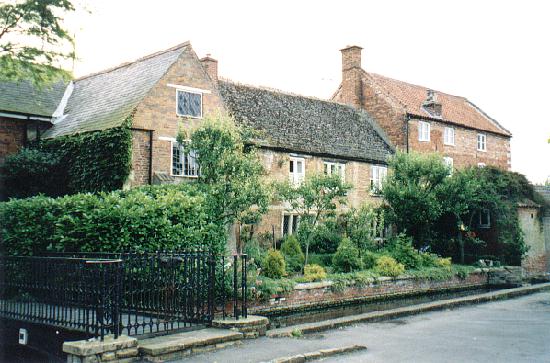 |
Bourne
Eau House between South Street and Church Walk, formerly The
Cedars, where William Wherry lived from 1894 until
his death in 1915.The elegant cast iron bridge over the Bourne Eau
on the left bears the date 1832 and the initial "M"
after the Mawby family who lived there previously.
|
Until 1894, William Wherry and his family had lived in West Street but he subsequently moved into the house in South Street that was included in the purchase from the Mawby estate. This was known as
The Cedars, a complex property on the site of the old Abbey infirmary comprising parts from the 16th to the 20th centuries and which took its name from the huge tree growing in the garden. The massive cedar blew down in a gale on 3rd January 1976 and its name was changed to Bourne Eau House that exists today between South Street and Church Walk.
He died at home on 24th May 1915 at the age of 74 after being in failing health for three years and he had been confined to his bed for the final two months. His funeral was held at Bourne cemetery where he was buried in the family grave beside his wife Emily who had died in a tragic accident at Hunstanton on
9th September 1897 at the age of 51. She was holidaying at the Norfolk
resort with two of her daughters and while crossing the road to return to
their apartments one evening, she was knocked down and killed by a lady
cyclist who lost control of her machine while riding down a steep hill
towards the station. Her body was brought back to Bourne the following
week for the funeral at the Baptist Chapel in West Street. An inquest
subsequently exonerated the cyclist, Miss Gertrude Howlett, an assistant
schoolmistress from Snettisham, from blame and the jury returned a verdict
of accidental death.
Wherry
left a grown up family of four sons and three daughters and an estate valued at £18,500. His daughters
Anne, Mary and Florence, inherited the Cedars and its contents while the business was left to his sons, Albert, Ernest, Frank and Arthur.
During
his lifetime, the four sons had all worked in the business, travelling to
various parts of the country on a weekly basis by train and keeping a
daunting schedule: Monday - London and Sleaford, Tuesday - Leeds, Spalding
and Burton-on-Trent, Wednesday - Manchester and Boston, Thursday -
Edinburgh, Friday - Lincoln and Stamford, Saturday - Peterborough. Albert
(1874-1962) worked with the Ministry of Agriculture during the First World
War and received the MBE while the Wherry company also supplied the NAAFI
with peas. His daughter Anne was a nurse in the First World War and served
under Edith Cavell, the Norfolk hospital matron who was executed for assisting
Allied prisoners escape to neutral Netherlands (see
box below) and Margaret was secretary
to Sir Arthur "Bomber" Harris, the Commander-in-Chief of Bomber
Command, during the Second World War. Until his death in 1957, Frank
carried on his father's social and council work, becoming chairman of
Bourne Urban District Council five times, in 1918-19, 1919-20, 1931-32,
1938-39 and 1947-48.
The esteem in which he had been held was echoed by the Stamford Mercury newspaper who said: "By the death of Alderman Wherry, there has been closed the life of one of Bourne's most respected townsmen, a businessman of exceptional ability, a public spirited man which few could equal, a man with a deeply religious character. Deceased was one of those many-sided characters of which there are few. He was a member of an old and respected family whose business associations with the town extended over a century. His public work was always actuated by the highest motives. A native of Bourne, he took full advantage of every opportunity to promote its welfare. In private life, the deceased gentleman was the friend of all and he showed a generous disposition. His removal has left a vacant place in the life of the town that will be difficult to fill."
In the year that he died, extensions were carried out to the Church Lane premises and the firm that he had done so much to establish continued to expand after his death. By 1965, Wherry and Sons Ltd had 120 employees and were conducting a wide-ranging business in the buying and selling of corn seed, contracting with farmers for the growing of seed, pea picking and packing, manufacturing compound feeding stuffs and wholesale grocery. They also ran a fleet of modern lorries and had introduced such innovations as electronic machinery for pea sorting but links to an earlier age were still visible by the bow window shop in North Street and the familiar sight of a horse and dray used for deliveries until 1967.
The firm moved to its present modern factory in that year when the 14-acre site of the old railway complex in Station Yard, Bourne, was purchased from British Rail and a modern pea processing plant erected from where products were despatched throughout the United Kingdom, the EEC and to countries such as Japan, Taiwan, Portugal and Iceland. The premises in Church Lane were later used as a youth employment centre for a time but were eventually demolished and the site redeveloped as a block of flats.
|
 |
|
William Wherry's name is still remembered in the town through the business he helped to build and by Wherry's Lane that runs alongside the premises his company once owned while a stone plaque bearing the initials of his father W W and the date
1846 can still be seen in the rear gable end of his North Street shop. |
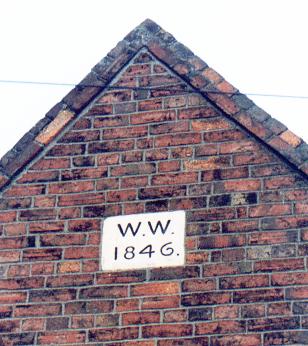 |
|
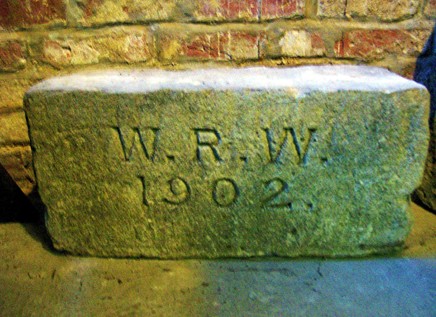 |
|
This date stone was incorporated in a new pea factory opened in
Church Walk in 1902 by William Robert Wherry (1841-1915). When the
building was demolished in 1985 to make way for a block of flats the
stone was salvaged and is now on display at the Heritage Centre.
|
|
THE DEATH OF
WILLIAM WHERRY senior
William Wherry senior died on
Wednesday 24th May 1882 after a period of ill health which did not
prevent him from continuing with his work as senior partner in the
firm of Messrs Edward Wherry and Sons, merchants. Apart from his
business activities, he had been chairman of the Bourne Gas and
Coke Company from its formation in 1840 until he resigned for
health reasons in 1879. He was also a deeply religious man, a
tireless worker for the Baptist Chapel in West Street, and serving
as secretary to the Bourne auxiliary of the Bible Society for 50
years, being presented with a handsome family bible for his work.
The funeral was held at the Baptist Chapel on Saturday 27th May,
conducted by the Rev William Orton, a former pastor who returned
to Bourne from Grimsby to take the service, and attended by a
large number of people. The pastor also preached the sermon at the
Sunday evening service when he paid tribute to Mr Wherry's
dedicated work for the Baptist cause.
THE MARRIAGE OF MISS
FLORENCE WHERRY
The wedding
was solemnised at St Andrew's church, Wilmcote, near
Stratford-upon-Avon, on Friday, by special sailor's licence from the Bishop of
Worcester, between Lieut-Commander J C Kerkham, RNR, of His Majesty's ship
Pembroke, and Miss F E Wherry, eldest daughter of Ald W R Wherry of Bourne. The Rev
R A Kerkham, father of the bridegroom, performed the ceremony. The bride was given
away by her brother Mr A E K Wherry of Bourne. The wedding was of a quiet
character, owing to the fact that the bridegroom was under orders to immediately join his ship.
The announcement of the happy event caused considerable interest at Bourne on Saturday,
the bride being well known and highly esteemed, and one who has taken a prominent
part in the social welfare of the town, the work of the Nursing Association
having received special attention.
-
news item from the Stamford Mercury, 15th January 1915
THE MARRIAGE OF
MISS ANNE WHERRY
A
cablegram has just been received stating that Miss Anne Wherry,
second daughter of the late Alderman W R Wherry, was married at
Bombay on Christmas Eve to Captain McDougal. The bride, who had
been trained as a nurse, was on active service during the war and
passed through some thrilling experiences including the torpedoing
of the boat on which she was crossing, and in the early part of
the war was for some weeks a prisoner. It was whilst on war
service that the contracting parties met. The announcement of the
marriage came as a surprise to everyone outside the members of the
family.
-
news item from the Stamford Mercury, 7th January 1921. |
|
THE WHERRY FAMILY GRAVE |
|
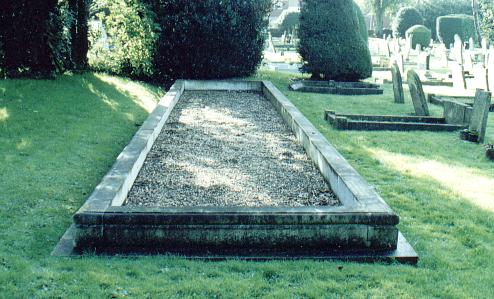
|
|
The family grave is by far the largest in the
cemetery, an oblong of marble laid close to the earth, simple in
design and understated, yet dignified, leaving the visitor in no
doubt that this is the the last resting place of important people
who served this town well. Those who are buried here include:
Mary Ann Wherry, died 30th March 1857, aged 18
Elizabeth Wherry, died 1st January 1862, aged 15
Elizabeth Wherry, died 13th October 1867, aged 58
William Wherry, died 27th May 1882, aged 79
Emily Wherry, died 14th September 1897, aged 51
William Robert Wherry, died 24th May 1915, aged 74
William Harold Wherry, died 27th June 1913, aged 34
Edmund Wherry, died 4th August 1928, aged 48
Frank Ernest Wherry, died 10th December 1957, aged 76
Lilian Annie Wherry, died 3rd July 1963, aged 80
Mary Gertrude Wherry, died 20th April 1968, aged 82
Victor Frank Carvath Wherry, died 15th February 1988, aged 75
Buried in a grave nearby with a separate headstone
Agnes D Wherry
born 28th September 1881, died 1st December 1970
widow of William Harold Wherry |
See also
An orange
for the pupils
Bourne Eau House Albert E K Wherry

Go to:
Main Index Villages
Index
|








